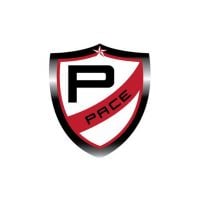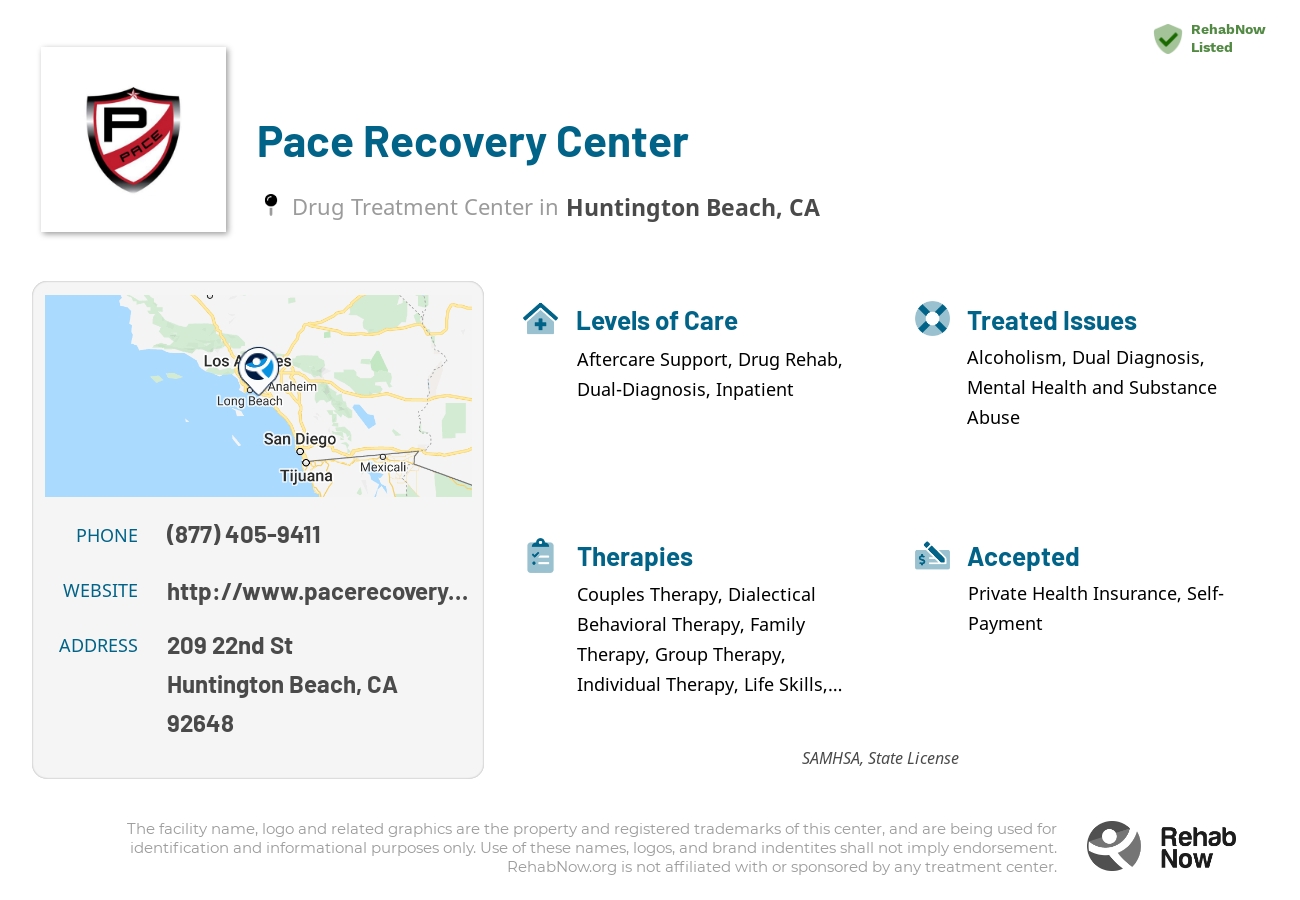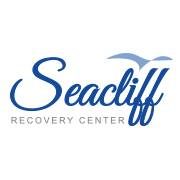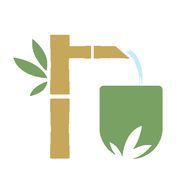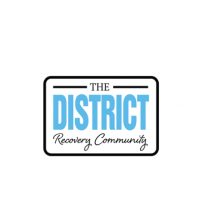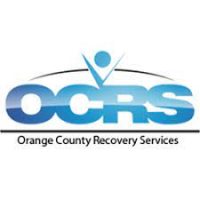About This California Facility
PACE Recovery Center, nestled in Huntington Beach, California, is a specialized private rehab facility focusing on men’s recovery from alcoholism, drug addiction, dual diagnoses, and mental health and substance abuse issues. Its approach goes beyond traditional treatments, emphasizing a holistic and gender-specific extended care strategy that aligns with dynamic 12-step recovery communities.
With accreditations from CARF, NAATP, a State License, and SAMHSA, PACE Recovery Center embodies a high standard of care. These certifications confirm its commitment to offering comprehensive and individualized treatment plans that address both psychological and physical aspects of addiction and recovery.
- Gender-specific care provides a unique environment for men to address and overcome their specific challenges.
- A holistic approach ensures that both mental health and substance abuse issues are treated simultaneously for more effective recovery.
- Extensive accreditations and certifications highlight the center’s dedication to maintaining the highest standards of treatment and care.
PACE Recovery Center specializes in treating a range of addictions including alcoholism, drug addiction, and opioid addiction, applying methods that include evidence-based therapies and comprehensive aftercare support. Levels of care offered range from inpatient and outpatient programs to partial hospitalization, tailored to meet each client’s individual recovery needs.
Genders
Ages
Modality
Additional
Accreditations
State License
SAMHSA
NAATP

CARF
The Commission on Accreditation of Rehabilitation Facilities (CARF) is a non-profit organization that specifically accredits rehab organizations. Founded in 1966, CARF's, mission is to help service providers like rehab facilities maintain high standards of care.
Conditions and Issues Treated
The inappropriate use of any drug in Huntington Beach, CA is substance abuse. This involves alcohol, medications, and illicit drugs. With a combination of physical and psychiatric therapies, drug addiction is successfully treated at Pace Recovery Center. After Detox is complete, individuals follow-up with treatments treating the root cause of the addiction.
Opioid Addiction Treatment supports people recovering from addiction to prescription drugs as well as illegal opioids. This is a hospital-based or residential treatment. Depending upon one’s age, detox without the appropriate medication may be unpleasant or even dangerous–some get body aches, fever, chills, while others may even have seizures.
Opioid treatment involves medically assisted detox, physical and mental support. Most rehabilitations use an array of treatments to ensure overall wellbeing, such as Medication-assisted therapy (MAT) in which one gets behavioral therapy, medicines, and counseling. A client-centered approach can reduce one’s chances of relapse. Therapists at work with the client to figure out environmental and behavioral triggers, giving them the power to change the patterns.
Levels of Care Offered at Pace Recovery Center
This center offers a variety of custom treatment tailored to individual recovery. Currently available are Aftercare Support, Drug Rehab, Dual-Diagnosis, Inpatient, Outpatient, Partial-Hospitalization, with additional therapies available as listed below.
An inpatient is a person who stays in a hospital or rehab center during treatment. For alcohol- and drug-dependent individuals, inpatient rehabs provide individualized around-the-clock services. Inpatient treatment programs address a person’s unique physical, medical, and psychological needs. A team of experts assess the severity of the addiction and design a highly tailored program. typically, the length of stay in an inpatient facility in Huntington Beach, CA is 30 days. Those with severe addiction may need to stay at the facility for 60 to 90 days.
Outpatient rehabilitation is a treatment that exists if a patient is not checking into Pace Recovery Center long term. In addition to helping them recover, the patient attends regular therapy sessions and detox and participates in other therapies. However, this is all primarily done from home. As a follow-up to inpatient treatment, outpatient treatment is usually recommended.
After rehabilitation, it helps people return to their everyday lives. It may also be an alternative to inpatient care in some situations. If they cannot leave their jobs, children, or don’t have the money for inpatient care, people can choose this method. Inpatient therapy, however, is the best method and most suggested level of treatment offered by Pace Recovery Center in recovering from addiction.
The halfway point between inpatient and outpatient care is Pace Recovery Center‘s Partial Hospitalization Program. It is for individuals in California who struggle with addiction but do not need treatment round the clock. Patients may reside in a recovery facility anywhere from 18 to 30 hours per week, but they can sleep at home. The program length could be anywhere from one to six months.
Treatment for substance abuse does not cease after an individual successfully completes a detox or rehabilitation program. A vital follow-up treatment service is aftercare support provided to individuals at Pace Recovery Center in California after they attain initial sobriety.
Aftercare support often takes the following forms: 12-Step Programs, Outpatient Treatment Programs, and Support Groups. The most effective aftercare programs are tailored to meet an individual’s specific needs and circumstances.
Therapies & Programs
Individual therapy involves one on one sessions between the patient and the therapist at Pace Recovery Center. Individual therapy provides patients with a safe environment where they can openly discuss their problems with the therapist. The patients find the therapist as a person who they can trust. It helps them to open up and discuss personal and sensitive issues, which they may not be comfortable discussing in a group setting.
Individual therapy aims to identify the core issues that would have led the patient to substance abuse and address the root cause effectively. The therapist can develop patient-specific customized solutions through individual therapy, which aids speedier recovery.
Addiction and alcoholism always harm an addict’s relationships with others and none more than relationships with a spouse or partner. Couples therapy is an essential part of restoring trust and good communication to intimate relationships harmed by addiction. Couples therapy by Pace Recovery Center helps repair the damage done to these important relationships.
Recovery can be more effective if the entire family’s involved. Family therapy hosted by Pace Recovery Center brings in the addict’s family to explore genetic factors. It gives loved ones the tools for dealing with addiction and its underlying mental issues. It is a recommended step in helping addicts adapt to sober living.
Trauma is one of the most common causes of psychological disorders. It’s often found in people with addiction diagnoses. Trauma therapy addresses this by examining the emotions and thoughts people have formed due to past traumas. Traumas are complex but trauma therapy can reduce their ability to contribute to addictive behaviors.
Dialectical Behavioral Therapy is a form of Cognitive Behavioral Therapy. It is designed for those who are prone to self-harm and suicidal behaviors. Pace Recovery Center aims to help patients understand the relationship between their thoughts, feeling and behaviors and it gives them the tools to make a change. It is effective for those whose addictions and behaviors stem from extreme mental health issues.
Self-defeating thoughts and habits can limit your possible successes. Some examples of this are procrastination, unhealthy eating and angry outbursts. REBT is a method of specific counseling offered by Pace Recovery Center that replaces negative and self-limiting thoughts.
EMDR stands for Eye Movement Desensitization and Reprocessing. It is a treatment method to work through traumatic memories to find resolution. It may involve eye movement, hand tapping or other small movements.
Rehabilitation is not just limited to bringing an individual out of addiction and achieving sobriety. It is considered complete only when an individual starts leading a normal and balanced life. Life skill therapy focuses on the various skills that helps an individual to lead a normal life. Patients often do not take care of themselves, struggle professionally and withdraw from social interaction due to the physical and emotional disturbances caused by addiction.
Life skills therapy helps them to improve various personal, professional and social skills such as cooking healthy meals, maintaining proper hygiene, budgeting, decision making, time management, regulation of emotions and resolving the interpersonal conflicts effectively.
A 12-Step Program is a common method that is used to treat addiction. This format is used for both drug and alcohol treatment. It is extremely popular and successful for large numbers of people and the staff at Pace Recovery Center are trained to assist in 12-step management.
The right diet can improve a person’s general outlook, sleep habits and thought processing skills. MNT also lowers the occurrence of chronic diseases such as adult-onset diabetes. Dieticians like those at Pace Recovery Center in Huntington Beach, CA believe that nutrition therapy is the key to making significant lifestyle changes.
Nicotine Replacement Therapy (NRT) uses low dose nicotine products to ween smokers away from cigarettes. The products get nicotine into the bloodstream without smoking reducing addiction to the physical habit. It also allows addicts to adjust to lower doses to reduce withdrawal symptoms.
Contingency Management (CM), also known as motivational incentives or prize method, is a behavioral therapy type. It is based on the principle that their consequences influence the behaviors of an individual. So, it promotes the desired behavior by giving rewards while discouraging the unwanted behaviors by withholding the rewards or even by giving punishments. One of the expected desired behavior is the absence of drug in a toxicology screen, and the rewards vary from prize or vouchers, to experiences. CM is used for individuals who need therapy for more than 3 months, and it has the advantage of being implemented by family members.
Patient Experience
Experiential Therapy at Pace Recovery Center
Experiential therapy involves recreating or creating new experiences for the patient. Many people struggled with past issues such as memories or trauma. By creating a new experience, it allows people to work through the issues associated with those moments in a new experience. This can give them a new measure of control and can help them role play a new scenario. That can help push addiction into their past and help them begin the healing process.
Fitness Therapy
Opting for fitness therapy allows someone to get through addiction recovery while effectively rebuilding their body. This is a great type of therapy to pair with nutritional therapy, as the combination of getting fit and eating right can help someone in recovery feel better and make healthier choices from the start. This therapy offered by Pace Recovery Center in Huntington Beach, CA establishes a firm connection between the body and mind, and teaches how to make healthy life habits that do not involve addiction.
Payment Options Accepted
For specific insurance or payment methods please contact us.
Is your insurance accepted?
Ask an expert, call (888) 674-0062
Pace Recovery Center Associated Centers
Discover treatment facilities under the same provider.
- Pace Recovery Center in Newport Beach, CA
- PACE Recovery Center - 16th Street in Huntington Beach, CA
Learn More About Pace Recovery Center Centers
Additional Details
Specifics, location, and helpful extra information.
Huntington Beach, California 92648 Phone Number(877) 405-9411 Meta DetailsUpdated April 15, 2024
Staff Verified
Patient Reviews
There are no reviews yet. Be the first one to write one.
Huntington Beach, California Addiction Information
More than 3 million of California's citizens are addicted to illegal drugs. Almost 800,000 people use hard drugs, almost 5 million use marijuana, and another 2.1 million abuse alcohol every year. Other substance abuse issues such as binge drinking and teen drug use are also common. Many illegal drugs such as cocaine, heroin, methamphetamine, and marijuana are smuggled into the state from Mexico.
Huntington Beach had the second-highest number of opioid overdose deaths from 2011 to 2015, with a total of 106 fatalities. It also has the highest DUI arrest and nighttime traffic accident rates. The most commonly used drugs in Huntington Beach are marijuana, cocaine, and opioids. The facilities in Huntington Beach offer expert assistance in managing withdrawal, detoxing safely, and working through the various stages of rehabilitation.
Treatment in Nearby Cities
- Palo Alto, CA (349.3 mi.)
- Venice, CA (34.0 mi.)
- Westlake Village, CA (56.2 mi.)
- Simi Valley, CA (60.5 mi.)
- Saratoga, CA (335.8 mi.)
Centers near Pace Recovery Center
The facility name, logo and brand are the property and registered trademarks of Pace Recovery Center, and are being used for identification and informational purposes only. Use of these names, logos and brands shall not imply endorsement. RehabNow.org is not affiliated with or sponsored by Pace Recovery Center.
